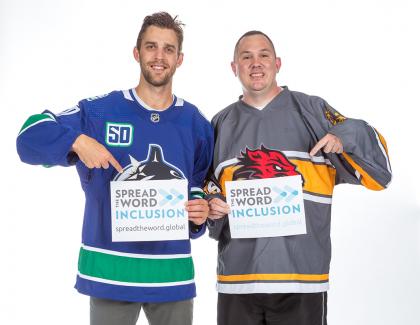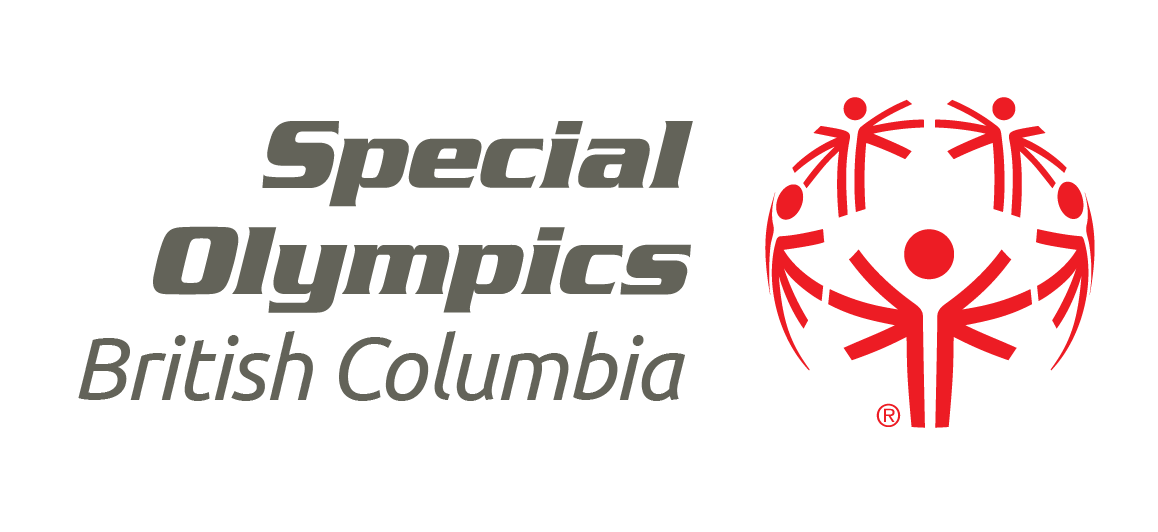
Spread the Word>>Inclusion is changing the world with language and actions of inclusion to end discrimination against individuals with intellectual disabilities!
Special Olympics champions throughout the province and around the world support the Spread the Word>>Inclusion campaign, in order to build inclusion and respect for people with intellectual disabilities. Everyone can make a difference by spreading the word for inclusion in your community, school, or workplace!
Annual Spread the Word>>Inclusion awareness day: first Wednesday in March
Grassroots Spread the Word>>Inclusion events happen year-round in schools and communities throughout the province. And Special Olympics BC and our supporters share messages of respect and understanding on the Spread the Word>>Inclusion awareness day and all year round!
Special Olympics BC – Chilliwack volunteer Megan Owens, co-creator of the Inclusion Revolution Sports project, teamed up with artist Neve Quadling to create inclusion colouring pages and worksheets! Any class or individual can use these fun tools to inspire thoughts and acts of inclusion! Check them out:
- Colouring pages
- Colouring page and worksheet for younger children
- Colouring page and worksheet for older kids
-Special Olympics BC – Langley athlete Christian Burton
In Abbotsford, SOBC coach and youth champion Roshan Gosal annually worked with volunteers in all of the 11 high schools and local athletes to run the campaign in every school, and gained the support of their local Mayor as well as the University of the Fraser Valley. Read about their success where they attracted more than 6,000 pledges of respect to date.
Across Canada, supporters also pledge respect by joining our friends at motionball in saying there’s #NoGoodWay to use the R-word.
Watch the video by Toronto singer Madison Tevlin
Watch champion Cabbie with stars from the Toronto Raptors, Maple Leafs, and Blue Jays
Sincere thanks to everyone who helps raise awareness and promote respect with these important campaigns!
About Spread the Word>>Inclusion
More than ever, the world is in need of action for inclusion. In schools, workplaces, and communities, old and new divisions are leading to exclusion, social isolation, and social abuse, robbing all of us of the opportunity to learn and grow together. People with intellectual and developmental disabilities know this better than almost anyone, as many of the nearly 200 million people with IDDs globally continue to be marginalized and excluded in schools, workplaces, and communities around the world.
But it doesn’t need to be this way. An inclusive world can be created through individual acts of inclusion: finding and welcoming those who have been left out, being a teammate, becoming a friend. We believe that inclusion is a skill that we can all practice – and when we do, we become better at including all people. That’s why we are asking everyone to pledge to include, to commit to an act of inclusion in their school, workplace, or community. These actions can be as simple as sitting with someone who was alone at lunch, or inviting someone who has been excluded to join a pick-up sports game.
-Special Olympics BC – Kamloops athlete Joshua Trudell
The Spread the Word to End the Word campaign worked to spread respect and inclusion for 11 years by addressing the excluding and demeaning impact of the words “retard(ed).” Since 2009, over 1 million people have pledged to end their use of the R-word. In 2017, 70 per cent of teens said they vocalized the wrong and demeaning use of the R-word when it used in conversation. Contrast that with 2009, when only 48 per cent of teens spoke up against it. The campaign’s new form – Spread the Word>>Inclusion – builds on the success of the past 10 years by continuing to challenge everyone to commit to respect and include.
There is much left to do to end exclusion, so we are calling on all people to pledge to include. Pledge to include at www.spreadtheword.global and show us your pledge of inclusion by tagging @PledgeToInclude and @specialolympicsbc on Facebook and Instagram + @PledgeToInclude and @sobcsociety on Twitter. #ChooseToInclude
It’s making a difference
In 2017, Special Olympics International released studies showing that a lot of progress has been made over the last nine years in promoting inclusion for all and changing attitudes and perceptions about people with intellectual disabilities. Teens, specifically, are standing up for inclusion and respect for all at school and in their communities. However, it appears that adults are aware of the R-word but are not as active in promoting inclusive behaviours.
Although the use of the R-word still exists and more acts of inclusion need to be encouraged, teens are having more connections with people with intellectual disabilities in school and in their neighborhoods, breaking down stereotypes and perceptions that exist for people with disabilities.
Several American studies from The Harris Poll conducted between 2008 and 2017 help provide a better picture of the use of the R-word by adults and teens, inclusive behaviours and overall acceptance for people with intellectual disabilities.
Some of the key findings were:
- Reinforcing respectful language: The growth in more compassionate positive responses when hearing the R-word is slightly more pronounced when the person being picked on has intellectual disabilities. Seventy per cent of teens in 2017 say they told the person it was wrong to say the R-word, compared to 48 per cent in 2008. Virtually no one said they didn't care or joined in, a significant drop from 2008 numbers of 12 per cent and four per cent, respectively. When looking at adults standing up for respectful language, only 63 per cent of adults told the person it was the wrong thing to say.
- Changing perceptions: Fewer teenagers are reporting they don't know anyone with intellectual disabilities. Thirty-one per cent said they didn't personally know anyone with ID in 2008, compared to 24 per cent in 2016 and an ultimate low of 18 per cent in 2017. The growth seems to be driven by higher connections with students in school, friends who don't go to their school, and neighbors who have ID.
- Outdated attitudes of the ‘R-word’: Nearly three in 10 teens (27 per cent) and four in 10 adults (38 per cent) still think that there's nothing wrong with using the word "retarded" to describe a thing or situation (as opposed to a person).
“Teens embracing inclusion are spreading a new conversation of acceptance, friendship, and empowerment,” said Soeren Palumbo, co-founder of the Spread the Word>>Inclusion campaign. “These agents of inclusion are re-writing the youth experience to no longer exclude people with intellectual disabilities but to include them as peers, teammates, and friends. The movement happening in our school hallways is gaining traction and pace to create a more inclusive society - and we will all be better for it.”
To date, the Spread the Word>>Inclusion campaign has generated more than 1 million pledges to end the use of the R-word, and millions more have signed banners and petitions throughout the world.
Contact
Megan Pollock
SOBC Marketing & Communications Director
Cell 604-737-3077
Email megan@specialolympics.bc.ca
